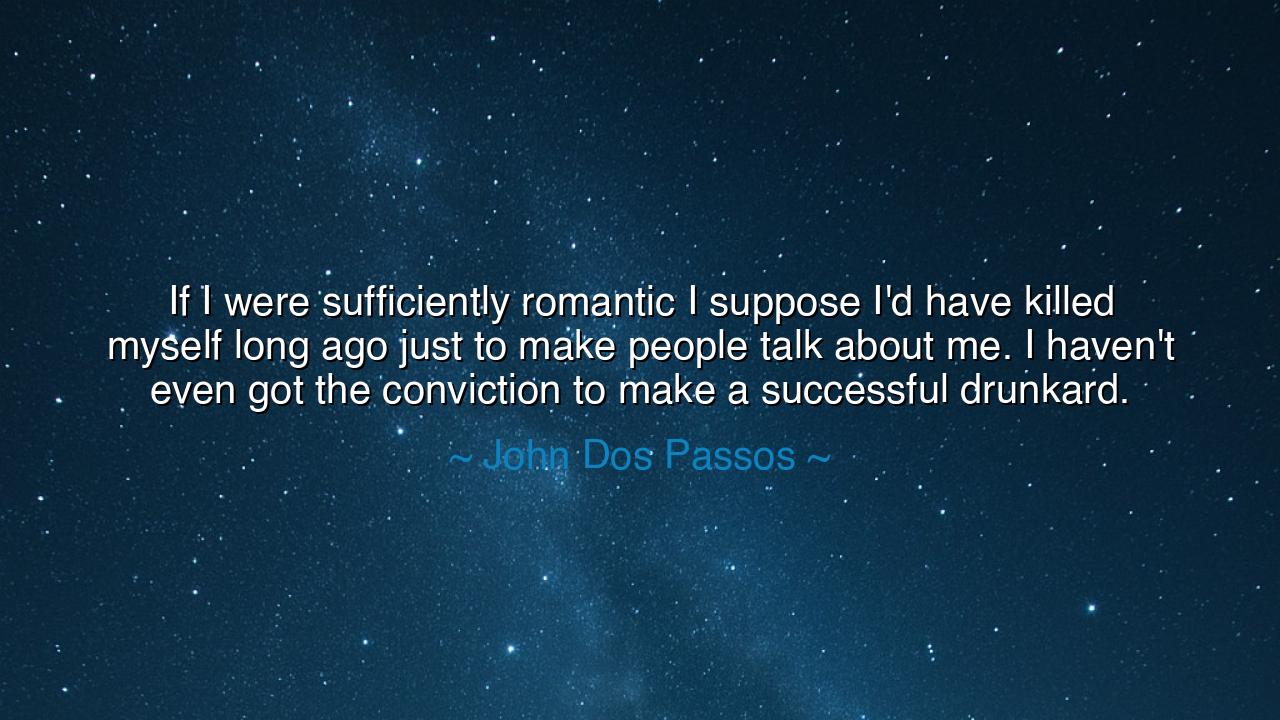
If I were sufficiently romantic I suppose I'd have killed myself
If I were sufficiently romantic I suppose I'd have killed myself long ago just to make people talk about me. I haven't even got the conviction to make a successful drunkard.






“If I were sufficiently romantic I suppose I’d have killed myself long ago just to make people talk about me. I haven’t even got the conviction to make a successful drunkard.” Thus wrote John Dos Passos, with the irony of a man who had seen the intoxications and the ruins of his age. His words burn with sarcasm, yet beneath them lies a meditation on the dangerous allure of romantic despair, the cult of self-destruction that has haunted poets and dreamers since time immemorial.
For in every age, there are those who imagine that to die young, to perish in flames of passion, is to achieve immortality. The romantic ideal whispers that tragedy itself is a form of glory—that by vanishing too soon, one will be remembered forever. Dos Passos mocks this temptation, declaring that if he had truly embraced such romanticism, he would have cast himself into death long ago. But he admits he lacks not only the will to die, but even the will to drown himself in drink. What he reveals is not weakness, but wisdom: a rejection of destruction disguised as grandeur.
The ancients themselves warned of this peril. Consider Achilles, who chose a short life of glory over a long life of obscurity. His name endures, yes, but his choice left nothing but grief in its wake. Or think of Catullus, whose burning love poems were so charged with passion that they destroyed his peace of mind. These figures remind us that to glorify ruin is itself a kind of madness, one that confuses self-destruction with strength. Dos Passos, in his bitter humor, strips away this illusion.
History offers us further lessons. The “Lost Generation” of writers, among whom Dos Passos lived, often flirted with despair. Hemingway, Fitzgerald, and others carried the scars of war and the weight of excess. Some drank themselves into collapse; others ended their lives. Their deaths are remembered, but often more than their lives, and Dos Passos seems to ask: is this truly romantic, or is it simply surrender? His mocking words challenge the cult of the doomed artist, pointing to the emptiness beneath the pose.
By confessing that he cannot be even a “successful drunkard,” Dos Passos reclaims his humanity. For to refuse destruction is not cowardice, but courage. It is far easier to collapse into oblivion than to endure, to keep working, to keep writing, to keep living when the world offers bitterness. In rejecting despair as a badge of honor, he speaks with a voice that is not merely cynical, but strong.
The lesson here is radiant: do not mistake self-destruction for romance. The world will sometimes praise the tragic, but true courage lies in perseverance. To continue living, creating, and striving requires more conviction than to abandon the fight. The artist who endures, who resists despair, leaves a legacy not of fleeting pity, but of lasting truth.
Therefore, dear listener, heed Dos Passos’s wisdom. Do not seek admiration in ruin, nor immortality in despair. Live, create, endure. Let your romance be not with death, but with life itself—with its struggles, its imperfections, its beauty. For the true hero is not the one who falls willingly into destruction, but the one who rises each day to labor again, even when the world seems dark. And in that endurance, you will find a nobler kind of immortality.






AAdministratorAdministrator
Welcome, honored guests. Please leave a comment, we will respond soon